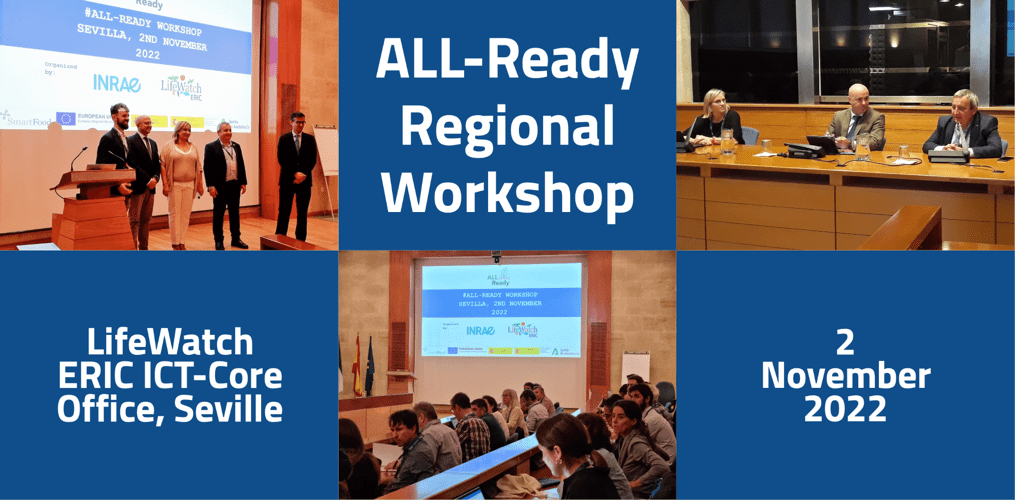
LifeWatch ERIC is hosting a hybrid regional workshop on 2 November for the ALL-Ready Project, at its ICT-Core office in Seville, located in the Cartuja Science and Technology Park. It will be attended by the project partners and more than 50 experts from Spain, Portugal, Greece, Bulgaria and Italy, of which 50% of the attendees are members of the Andalusian agricultural and agri-food sectors. Presenting will be Consolación Vera, General Secretary of Agriculture, Livestock and Food of the Junta de Andalucía, and José Carlos Álvarez, Managing Director of AGAPA, the Andalusian Agricultural and Fisheries Management Agency, alongside representatives of workshop organisers LifeWatch ERIC (Juan Miguel González-Aranda, CTO) and INRAE (Heather McKhann, Muriel Mambrini-Doudet). The Ministry of Agriculture, Fisheries, Water and Rural Development of the Junta de Andalucía and its organic farming working group are also collaborating in the organisation of the event, to involve the Andalusian community of farmers (through the SmartFood project). They will present as a success story their experience promoting and stimulating the creation of Living Labs in Agroecology to enhance the presence of Andalusian farmers in the European Association. More information on the workshop and attendees here.
The important news from this Horizon2020 project is that the European Commission, through Horizon Europe, is designing the European Association to Accelerate the Transition of Agricultural Systems through Living Labs (collaborative workspaces) and Research Infrastructures in Agroecology, formed of the ALL-Ready project consortium and the experts in attendance at the workshop. The aim is over the next seven years to mobilise more than 500 million euros in order to bring the green and digital revolution to fruition in the agricultural sector, in line with the European Green Deal, the Farm to Fork Strategy, the European Biodiversity Strategy 2030, the new Common Agricultural Policy (CAP) and the UN SDGs. At the workshop, the participants will work together to propose the focus, maturity and financing of their initiatives, taking into account the practices and values of ALL-Ready, to define their respective roles in the network. Another goal is to boost the participation of local agents from Southern Europe in the initiatives that will be organised by the Association.
For its part, LifeWatch ERIC has been designated by the European Commission as the Reference Research Infrastructure for the management of knowledge, data and infrastructure of Information Technology Association, and to help contribute to a green and digital revolution across Europe. To this end, the infrastructure is developing an innovative Virtual Research Environment based on its Tesseract and LifeBlock (which uses Blockchain) platforms, which will support the tokenisation of ecosystem services to enable ecosystem monitoring and tracking and CAP schemes based on agroecological practices and low-carbon agriculture. These developments carried out from Andalusia through its AstarteWatch network will be duly federated at a pan-European level through the LifeWatch ERIC e-Infrastructure.
In the two days following the regional workshop on 2 November, the ALL-Ready Annual Meeting morning will take place between the 13 entities of the project consortium, hosted by LifeWatch ERIC. Together, they will analyse the achievements made in the first phases of the project, define and plan the next steps, organise the growing involvement of all sectors linked to agroecology and model the training courses that contribute to systematising the legacy of this project and its continuity.
To learn more about the projects in which LifeWatch ERIC is involved, please see the Related Projects page.